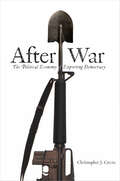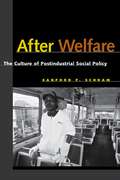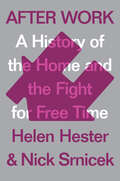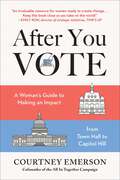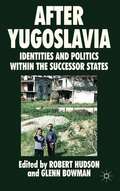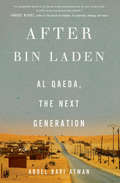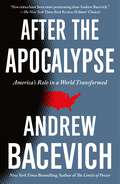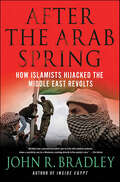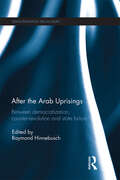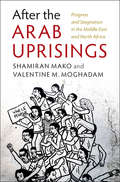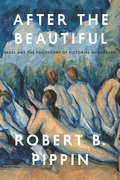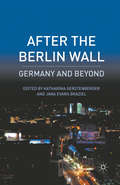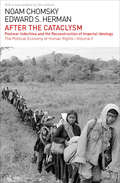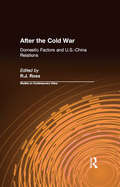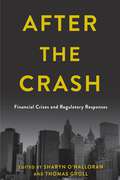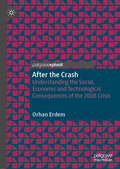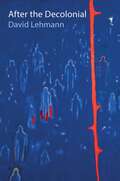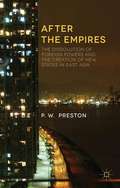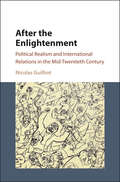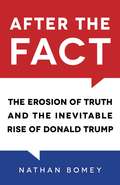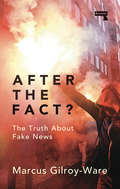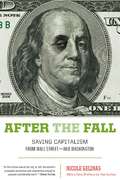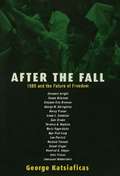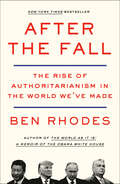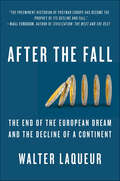- Table View
- List View
After War: The Political Economy of Exporting Democracy
by Christopher J. CoyneParts of this book were presented at the Economics Seminar Series at West Virginia University; the Workshop in Applied Political Economy at San Jose State University; The Mercatus Center at George Mason University
After Welfare: The Culture of Postindustrial Social Policy
by Sanford F. SchramDo contemporary welfare policies reflect the realities of the economy and the needs of those in need of public assistance, or are they based on outdated and idealized notions of work and family life? Are we are moving from a "war on poverty" to a "war against the poor?" In this critique of American social welfare policy, Sanford F. Schram explores the cultural anxieties over the putatively deteriorating "American work ethic," and the class, race, sexual and gender biases at the root of current policy and debates. Schram goes beyond analyzing the current state of affairs to offer a progressive alternative he calls "radical incrementalism," whereby activists would recreate a social safety net tailored to the specific life circumstances of those in need. His provocative recommendations include a series of programs aimed at transcending the prevailing pernicious distinction between "social insurance" and "public assistance" so as to better address the needs of single mothers with children. Such programs could include "divorce insurance" or even some form of "pregnancy insurance" for women with no means of economic support. By pushing for such programs, Schram argues, activists could make great strides towards achieving social justice, even in today's reactionary climate.
After Work: A History of the Home and the Fight for Free Time
by Helen Hester Nick SRNICEKA timely manifesto for a feminist post-work politicsDoes it ever feel like you have no free time? You come home after work and instead of finding a space of rest and relaxation, you&’re confronted by a pile of new tasks to complete – cooking, cleaning, looking after the kids, and so on.In this ground-breaking book, Helen Hester and Nick Srnicek lay out how unpaid work in our homes has come to take up an ever-increasing portion of our lives – how the vacuum of free time has been taken up by vacuuming. Examining the history of the home over the past century – from running water to white goods to smart homes – they show how repeated efforts to reduce the burden of this work have faced a variety of barriers, challenges, and reversals.Charting the trajectory of our domestic spaces over the past century, Hester and Srnicek consider new possibilities for the future, uncovering the abandoned ideas of anti-housework visionaries and sketching out a path towards real free time for all, where everyone is at liberty to pursue their passions, or do nothing at all. It will require rethinking our living arrangements, our expectations and our cities.
After You Vote: A Woman's Guide to Making an Impact, from Town Hall to Capitol Hill
by Courtney EmersonNAUTILUS BOOK AWARD SILVER MEDALIST — SOCIAL CHANGE & SOCIAL JUSTICE When the election is over, the work is just beginning. The future of America depends on what you do after you vote. Today, women in the United States are more educated and politically ambitious than ever before. However, the record numbers of women running for office, casting votes, and marching for change haven't translated into full and equal political participation. Despite significant progress, women are less likely than men to engage in a range of important political activities—from speaking up on the issues they care about to holding their representatives accountable. Equal parts information and inspiration, After You Vote is both a primer and call-to-action for women of all ages who want to exercise their voices and engage more fully in civic life. It's the ultimate guide to political engagement, filled with practical (and proven) tactics to help women make their voices heard and have an influence on the issues they care about most. This book will help you: Brush up on civics—federal, state, and local Prioritize your issues Use the most effective advocacy tactics Stick with it for the long haul (politics is a marathon, not a sprint!) The question isn't if you can create change on behalf of the issues you care about. You can. The question is: What's at stake if you don't?
After Yugoslavia
by Glenn Bowman Robert HudsonAn investigation of recent developments and trends within the Yugoslav successor states since the signing of the Dayton Agreements in Autumn 1995. This book offers a distinctive and desirable perspective on the seven successor states, their cultures, politics and identities by providing an internal perspective on the region and its developments.
After bin Laden: Al Qaeda, the Next Generation
by Abdel Bari AtwanAn &“intelligent and fascinatingly readable&” examination of Al Qaeda after the death of its longtime leader, by the renowned Arab world journalist (Pat Lancaster, editor in chief of Middle East Magazine). Osama bin Laden is dead, yet Al Qaeda remains the CIA&’s number one threat. Since the 9/11 attacks on the United States, and the US military&’s subsequent strikes, the organization has evolved into a much more complex and far-flung entity. This richly documented account of Al Qaeda moves well beyond the headlines to offer readers a deeper understanding of the organization&’s aims, strategies, and fortunes in a new era of conflict with the United States and the Western powers. Drawing on firsthand accounts and interviews with uniquely well-placed sources within Al Qaeda, noted journalist and expert Abdel Bari Atwan investigates the movement&’s new internal dynamics, how it survives financially, and how its political appeal has changed dramatically following the Arab Spring. Atwan profiles the next generation of leaders and explores both the new methods they embrace—especially on the digital battlefield—as well as the global range of their operations and local variations in Somalia, Afghanistan, Pakistan, Libya, Algeria, Tunisia, Morocco, and elsewhere. &“Abdel Bari Atwan has long been one of the sharpest commentators about Al Qaeda and the Middle East.&” —Peter Bergen, author of Manhunt: The Ten-Year Search for Osama bin Laden, from 9/11 to Abottabad &“A sobering, intensive report.&” —Kirkus Reviews
After the Apocalypse: America's Role in a World Transformed (American Empire Project)
by Andrew BacevichA bold and urgent perspective on how American foreign policy must change in response to the shifting world order of the twenty-first century, from the New York Times bestselling author of The Limits of Power and The Age of Illusions.The purpose of U.S. foreign policy has, at least theoretically, been to keep Americans safe. Yet as we confront a radically changed world, it has become indisputably clear that the terms of that policy have failed. Washington’s insistence that a market economy is compatible with the common good, its faith in the idea of the “West” and its “special relationships,” its conviction that global military primacy is the key to a stable and sustainable world order—these have brought endless wars and a succession of moral and material disasters.In a bold reconception of America’s place in the world, informed by thinking from across the political spectrum, Andrew J. Bacevich—founder and president of the Quincy Institute for Responsible Statecraft, a bipartisan Washington think tank dedicated to foreign policy—lays down a new approach—one that is based on moral pragmatism, mutual coexistence, and war as a last resort. Confronting the threats of the future—accelerating climate change, a shift in the international balance of power, and the ascendance of information technology over brute weapons of war—his vision calls for nothing less than a profound overhaul of our understanding of national security.Crucial and provocative, After the Apocalypse sets out new principles to guide the once-but-no-longer sole superpower as it navigates a transformed world.
After the Arab Spring: How Islamists Hijacked the Middle East Revolts
by John R. BradleyFrom the author of the book that uniquely predicted the Egyptian revolution, a new message about the Middle East: everything we're told about the Arab Spring is wrong. When popular revolutions erupted in Tunisia and Egypt, the West assumed that democracy and pluralism would triumph. Greatly praised author and foreign correspondent John R. Bradley draws on his extensive firsthand knowledge of the region's cultures and societies to show how Islamists will fill the power vacuum in the wake of the revolutions. This vivid and timely book gives an original analysis of the new Tunisia, Egypt, Syria, Yemen, Libya, and Bahrain by highlighting the dramatic spread of Saudi-funded Wahhabi ideology, inter-tribal rivalries, and Sunni-Shia divisions. Bradley gives a boots on the ground look at how the revolutions were first ignited and the major players behind them, and shows how the local population participated in and responded to the uprisings. In Tunisia he witnesses secularists under violent attack and in Egypt observes radical Islamists taking control of the streets. He illuminates the ancient sectarian strife shaking Bahrain, fierce civil war pitching tribe against tribe in Libya and Yemen, and ethnic divisions threatening to tear apart Syria and Iran. Taking it one step further, Bradley offers a comprehensive look at how across countries, liberal, progressive voices that first rallied the Arab masses were drowned out by the slogans of the better-organized and more popular radical Islamists. With the in-depth knowledge of a local and the keen perspective of a seasoned reporter, After the Arab Spring offers a piercing analysis of what the empowerment of Islamism bodes for the future of the Middle East and the impact on the West.
After the Arab Uprisings: Between Democratization, Counter-revolution and State Failure (Democratization Special Issues)
by Raymond HinnebuschThe Arab Uprisings that began in 2010 removed four presidents and made more mobilized mass publics an increased factor in the politics of regional states. The main initial problematic of the Arab Uprising was how to translate mass protest into democratization and ultimately democratic consolidation; yet four years later, there was little democratization. This book explores various aspects of this question while, comparing outcomes in three states, Egypt, Syria and Tunisia. The introduction by Raymond Hinnebusch explores how far different starting points —the features of the regime and of the uprising--explain these pathways. Morten Valbjørn then considers the consequences of the Arab uprisings for the credibility of rival democratization and post-democratization paradigms. Vincent Durac examines the efficacy of anti-system social movements in challenging regimes but their inability to steer a democratic transition. Joshua Stacher examines the increased violence deployed by more conercive authoritarian regimes to prevent such a transition. Frede´ric Volpi and Ewan Stein examine the conseuences of the relative balance between different kinds of Islamists for outcomes. James Allison then examines the impact of workers’ movements on democratic potentials. Adham Saouli assesses the mobilization of communal identities by ruling elites and counter-elites. Raymond Hinnebusch focuses on the negative impact on democratization of competitive external interference inside the uprising states. In Hinnebusch’s conclusion, the combined effects of the agency of these forces and the political, cultural, and economic contexts in which they operate are summarized. This book was previously published as a special issue of Democratization.
After the Arab Uprisings: Progress and Stagnation in the Middle East and North Africa
by Valentine M. Moghadam Shamiran MakoWhy were some, but not all the Arab mass social protests of 2011 accompanied by relatively quick and nonviolent outcomes in the direction of regime change, democracy, and social transformation? Why was a democratic transition limited to Tunisia, and why did region-wide democratization not occur? After the Arab Uprisings offers an explanatory framework to answer these central questions, based on four key themes: state and regime type, civil society, gender relations and women's mobilizations, and external influence. Applying these to seven cases: Tunisia, Egypt, Morocco, Bahrain, Libya, Syria, and Yemen, Valentine M. Moghadam and Shamiran Mako highlight the salience of domestic and external factors and forces, uniquely presenting women's legal status, social positions, and organizational capacity, along with the presence or absence of external intervention, as key elements in explaining the divergent outcomes of the Arab Spring uprisings, and extending the analysis to the present day.
After the Beautiful: Hegel and the Philosophy of Pictorial Modernism
by Robert B. PippinIn his Berlin lectures on fine art, Hegel argued that art involves a unique form of aesthetic intelligibility—the expression of a distinct collective self-understanding that develops through historical time. Hegel’s approach to art has been influential in a number of different contexts, but in a twist of historical irony Hegel would die just before the most radical artistic revolution in history: modernism. In After the Beautiful, Robert B. Pippin, looking at modernist paintings by artists such as Édouard Manet and Paul Cézanne through Hegel’s lens, does what Hegel never had the chance to do. While Hegel could never engage modernist painting, he did have an understanding of modernity, and in it, art—he famously asserted—was “a thing of the past,” no longer an important vehicle of self-understanding and no longer an indispensable expression of human meaning. Pippin offers a sophisticated exploration of Hegel’s position and its implications. He also shows that had Hegel known how the social institutions of his day would ultimately fail to achieve his own version of genuine equality, a mutuality of recognition, he would have had to explore a different, new role for art in modernity. After laying this groundwork, Pippin goes on to illuminate the dimensions of Hegel’s aesthetic approach in the path-breaking works of Manet, the “grandfather of modernism,” drawing on art historians T. J. Clark and Michael Fried to do so. He concludes with a look at Cézanne, the “father of modernism,” this time as his works illuminate the relationship between Hegel and the philosopher who would challenge Hegel’s account of both modernity and art—Martin Heidegger. Elegantly inter-weaving philosophy and art history, After the Beautiful is a stunning reassessment of the modernist project. It gets at the core of the significance of modernism itself and what it means in general for art to have a history. Ultimately, it is a testament, via Hegel, to the distinctive philosophical achievements of modernist art in the unsettled, tumultuous era we have inherited.
After the Berlin Wall: Germany and Beyond
by Beyond GermanyTwenty years after its fall, the wall that divided Berlin and Germany presents a conceptual paradox: on one hand, Germans have sought to erase it completely; on the other, it haunts the imagination in complex and often surprising ways
After the Cataclysm: Postwar Indochina and the Reconstruction of Imperial Ideology (The Political Economy of Human Rights #2)
by Noam Chomsky Edward S. HermanVolume two of the influential study of US foreign policy during the Cold War—and the media&’s manipulative coverage—by the authors of Manufacturing Consent. First published in 1979, Noam Chomsky and Edward Herman&’s two-volume work, The Political Economy of Human Rights, is a devastating analysis of the United States government&’s suppression of human rights and support of authoritarianism in Asia, Africa and Latin America during the 1960s and 70s. Still one of the most comprehensive studies of the subject, it demonstrates how government obscured its role in torture, murder and totalitarianism abroad with the aid of the news media. In the first volume, Chomsky and Herman focus on US terror in Indochina. In volume two, After the Cataclysm, the authors examine the immediate aftermath of those actions, with special focus on the Khmer Rouge takeover of Cambodia. Throughout, the authors track the media response to the US interventions—a mixture of willful silence and Orwellian misrepresentation.
After the Cold War: Domestic Factors and U.S.-China Relations
by R.J. RossAs relations between the United States and China move into a period of intense activity and sensitivity, this timely book addresses the impact of domestic factors in both countries on their post-Cold War/post-Tiananmen relations. The contributors examine the issue from a number of distinct perspectives: the increased impact of domestic factors in both countries due to changing strategic circumstances; the politics of China policy in the United States, with emphasis on the role of interest groups vis-a-vis Congress, the media, and other domestic institutions; the importance of domestic factors in U.S.-China economic conflicts; the combined impact of domestic factors in both China and the United States on the most important conflict of interest in U.S.-China relations -- the Taiwan issue.
After the Crash: Financial Crises and Regulatory Responses
by Thomas O’Halloran Sharyn GrollThe 2008 crash was the worst financial crisis and the most severe economic downturn since the Great Depression. It triggered a complete overhaul of the global regulatory environment, ushering in a stream of new rules and laws to combat the perceived weakness of the financial system. While the global economy came back from the brink, the continuing effects of the crisis include increasing economic inequality and political polarization. <P><P>After the Crash is an innovative analysis of the crisis and its ongoing influence on the global regulatory, financial, and political landscape, with timely discussions of the key issues for our economic future. It brings together a range of experts and practitioners, including Joseph Stiglitz, a Nobel Prize winner; former congressman Barney Frank; former treasury secretary Jacob Lew; Paul Tucker, a former deputy governor of the Bank of England; and Steve Cutler, general counsel of JP Morgan Chase during the financial crisis. Each poses crucial questions: What were the origins of the crisis? How effective were international and domestic regulatory responses? Have we addressed the roots of the crisis through reform and regulation? Are our financial systems and the global economy better able to withstand another crash? After the Crash is vital reading as both a retrospective on the last crisis and an analysis of possible sources of the next one.
After the Crash: Understanding the Social, Economic and Technological Consequences of the 2008 Crisis
by Orhan ErdemThis book seeks to diagnose and analyze the social, economic and technological consequences of the 2008 financial crisis, which brought epochal changes to our lives. First and foremost, a paradigm shift arose in economic theories that fail to predict or explain the crisis. On the governmental side, we have been observing a natural parallel between authoritarianism and the way many democratic countries are being governed. Liberalism seems to have failed. Driven by the anger over the crisis and its heavy burden, a variety of technological innovations were birthed and gained momentum. Bitcoin was a manifesto to the monetary system; sharing economy was a rebellion to the consumerist lifestyle; and subscriptions were a threat to ownership. This books ties each of these events to the 2008 crisis and explains the connection.
After the Decolonial: Ethnicity, Gender and Social Justice in Latin America
by David LehmannAfter the Decolonial examines the sources of Latin American decolonial thought, its reading of precursors like Fanon and Levinas and its historical interpretations. In extended treatments of the anthropology of ethnicity, law and religion and of the region’s modern culture, Lehmann sets out the bases of a more grounded interpretation, drawing inspiration from Mexico, Brazil, Bolivia and Chile, and from a lifelong engagement with issues of development, religion and race. The decolonial places race at the centre of its interpretation of injustice and, together with the multiple other exclusions dividing Latin American societies, traces it to European colonialism. But it has not fully absorbed the uniquely unsettling nature of Latin American race relations, which perpetuate prejudice and inequality, yet are marked by métissage, pervasive borrowing and mimesis. Moreover, it has not integrated its own disruptive feminist branch, and it has taken little interest in either the interwoven history of indigenous religion and hegemonic Catholicism or the evangelical tsunami which has upended so many assumptions about the region’s culture. The book concludes that in Latin America, where inequality and violence are more severe than anywhere else, and where COVID-19 has revealed the deplorable state of the institutions charged with ensuring the basic requirements of life, the time has come to instate a universalist concept of social justice, encompassing a comprehensive approach to race, gender, class and human rights.
After the Empires
by P. W. PrestonThe shift to the modern world in East Asia was accomplished in part via the experience of colonial rule in the late nineteenth century. Following imperial crisis in the 1930s and 1940s, independent nation states formed from which the political structure of East Asia is based today.
After the Enlightenment: Political Realism and International Relations in the Mid-Twentieth Century
by Nicolas GuilhotAfter the Enlightenment is the first attempt at understanding modern political realism as a historical phenomenon. Realism is not an eternal wisdom inherited from Thucydides, Machiavelli or Hobbes, but a twentieth-century phenomenon rooted in the interwar years, the collapse of the Weimar Republic, and the transfer of ideas between Continental Europe and the United States. The book provides the first intellectual history of the rise of realism in America, as it informed policy and academic circles after 1945. It breaks through the narrow confines of the discipline of international relations and resituates realism within the crisis of American liberalism. Realism provided a new framework for foreign policy thinking and transformed the nature of American democracy. This book sheds light on the emergence of 'rational choice' as a new paradigm for political decision-making and speaks to the current revival in realism in international affairs.
After the Fact: The Erosion of Truth and the Inevitable Rise of Donald Trump
by Nathan BomeyThis trenchant analysis examines the many ways our society's increasingly tenuous commitment to facts laid the groundwork for Donald Trump's rise to power.Award-winning journalist Nathan Bomey argues that Trump did not usher the post-truth era into being. He was its inevitable outcome. Bomey points to recent trends that have created the perfect seedbed for spin, distortion, deception, and bald-faced lies: shifting news habits, the rise of social media, the spread of entrenched ideologies, and the failure of schools to teach basic critical-thinking skillsThe evidence supporting the author's argument is all around us: On Facebook, we present images of our lives that ignore the truth and intentionally deceive our friends and family. We consume fake news stories online and carelessly circulate false rumors. In politics, we vote for leaders who leverage political narratives that favor ideology over science. And in our schools, we fail to teach students how to authenticate information.After the Fact explores how the convergence of technology, politics, and media has ushered in the misinformation age, sidelining the truth and threatening our core principle of community.
After the Fact?: The Truth about Fake News
by Marcus Gilroy-WareWhy do we no longer trust facts, experts and statistics? In this essential guide to the turbulent times in which we live, Marcus Gilroy-Ware investigates our era of post-truths and fake news and answers the question of where we can go from here.We are supposed to have more information at our disposal now than at any time in history. So why, in a world of rising sea levels, populist leaders, resurgent fascism and a global pandemic, do so many people believe bizarre and untrue things about the world we live in? In After the Fact?, Marcus Gilroy-Ware shows us what really created the conditions for mis- and disinformation, from fake news and conspiracy theories, to bullshit journalism and the resurgence of the far-right, and why liberal newspaper columnists and centrist politicians are unable to turn back this tide. Spanning politics, culture, psychology, journalism, and much more, After the Fact? is a timely wake-up call for those who believe we can simply go "back to normal", and instead argues that, if we are to put an end to "fake news" we must deal with the broader social crises that are responsible for it.
After the Fall
by Nicole GelinasRobust financial markets support capitalism, they don't imperil it. But in 2008, Washington policymakers were compelled to replace private risk-takers in the financial system with government capital so that money and credit flows wouldn't stop, precipitating a depression.Washington's actions weren't the start of government distortions in the financial industry, Nicole Gelinas writes, but the natural result of 25 years' worth of such distortions.In the early eighties, modern finance began to escape reasonable regulations, including the most important regulation of all, that of the marketplace. The government gradually adopted a "too big to fail" policy for the largest or most complex financial companies, saving lenders to failing firms from losses. As a result, these companies became impervious to the vital market discipline that the threat of loss provides.Adding to the problem, Wall Street created financial instruments that escaped other reasonable limits, including gentle constraints on speculative borrowing and requirements for the disclosure of important facts.The financial industry eventually posed an untenable risk to the economy -- a risk that culminated in the trillions of dollars' worth of government bailouts and guarantees that Washington scrambled starting in late 2008.Even as banks and markets seem to heal, lenders to financial companies continue to understand that the government would protect them in the future if necessary. This implicit guarantee harms economic growth, because it forces good companies to compete against bad.History and recent events make clear what Washington must do.First, policymakers must reintroduce market discipline to the financial world. They can do so by re-creating a credible, consistent way in which big financial companies can fail, with lenders taking their warranted losses. Second, policymakers can reapply prudent financial regulations so that markets, and the economy, can better withstand inevitable excesses of optimism and pessimism. Sensible regulations have worked well in the past and can work well again.As Gelinas explains in this richly detailed book, adequate regulation of financial firms and markets is a prerequisite for free-market capitalism -- not a barrier to it.
After the Fall: 1989 and the Future of Freedom (New Political Science Reader Ser.)
by George KatsiaficasDid the U.S. really "win" the Cold War? Is the fall of Communism only a temporary setback for Marxism, or has the freemarket prevailed, once and for all? In this work, the last ten years are examined by the most important Marxist scholars and journalists.
After the Fall: Being American in the World We've Made
by Ben RhodesWhy is democracy so threatened in America and around the world? And what can we do about it? A former White House aide and close confidant to President Barack Obama—and the New York Times bestselling author of The World as It Is—travels the globe in a deeply personal, beautifully observed quest for answers. <P><P>In 2017, as Ben Rhodes was helping Barack Obama begin his next chapter, the legacy they had worked to build for eight years was being taken apart. To understand what was happening in America, Rhodes decided to look outward. Over the next three years, he traveled to dozens of countries, meeting with politicians, activists, and dissidents confronting the same nationalism and authoritarianism that was tearing America apart. Along the way, a Russian opposition leader he spoke with was poisoned, the Hong Kong protesters he came to know saw their movement snuffed out, and America itself reached the precipice of losing democracy before giving itself a second chance. <P><P>Part memoir and part reportage, After the Fall is a hugely ambitious and essential work of discovery. In his travels, Rhodes comes to realize how much America’s fingerprints are on a world we helped to shape, through our post–Cold War embrace of unbridled capitalism and our post-9/11 nationalism and militarism; our mania for technology and social media; and the racism that fueled the backlash to America’s first Black president. At the same time, Rhodes learns from the stories of a diverse set of characters—from Barack Obama himself to Cuban rebels to a rising generation of international leaders—that looking squarely at where America has gone wrong makes clear how essential it is to fight for what America is supposed to be, for our own country and the entire world. <P><P><b>A New York Times Bestseller</b>
After the Fall: The End of the European Dream and the Decline of a Continent
by Walter LaqueurA master historian takes us deep into the heart of Europe's current political and financial crisisWalter Laqueur was one of the few experts who predicted Europe's current financial and political crisis when he wrote The Last Days of Europe six years ago. Now this master historian takes readers inside the European crisis that he foresaw. Ravaged by the world economic meltdown, increasingly dependent on imported oil and gas, and lacking a common foreign policy, Europe is in dire straits. With the authority that comes from thirty years of experience as an expert on political affairs, the author predicts the future prospects of this troubled continent. Europe is the United States' closest ally, and its prosperity is vital to American's success and security. This is a must-read for anyone invested in our country's future.
